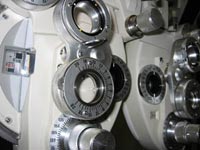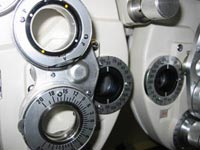1. Professional services:
General vision examination:
Visual examinations usually take about 45 minutes and cost $78.
A full visual examination usually includes:
- Questions about your medical and eye history
- An assessment of your internal eye health including retina, optic disc, blood vessels including a digital retinal photograph.
- A Slit-lamp assessment of your external eye including lids and lashes
- An assessment of your colour perception
- Examination to assess glaucoma including a measure of the pressure in each eye
- An assessment of visual functions including any refractive error
- Tests of your eye muscles to check they move and coordinate properly
- Visual fields test.
- An assessment of pupils function and response
- Discussion of the diagnosis
- Discussion of the management options and plan for treatment. This may require additional tests and where appropriate referral to an ophthalmologist or medical specialist.
 |
 |
Childrens Vision
There is a clear link between a child’s ability to see well and his or her ability to learn and succeed in school.
Children learn mostly with their eyes. Reading, writing, blackboard work, computers, playtime and sports are all hard work if you cannot see clearly. Many everyday tasks for children involve seeing quickly and using visual information.
Good vision includes seeing well at a distance and also for close work. Good vision depends on good eye health and good eye function. Good eye function involves visual integration and visual skills such as using the eyes together, focusing the eyes properly and changing focus appropriately, and moving the eyes when needed.
What to look out for:
Parents and teachers can look out for the following signs that a child may have a vision problem.
- Dislike and avoidance of close work
- Sitting at table with an awkward posture
- Turning or tilting the head to one side
- Closing one eye while reading
- Taking an unusually long time to complete reading comprehension tasks
- Moving closer to a book, desk or computer screen while reading
- Excessive blinking or rubbing of eyes
- Losing place while reading; skipping or re-reading lines or words
- Complaints of headache, dizziness and nausea
- Needing to sit close to the TV or board at school to see clearly
- Lack of confidence in group sports and activities
We try to make our childrens visual examination fun and non threatening.
Children who have a Community Services Card can receive a free eye examination and spectacles up to the value of $237 every year.
Our childrens visual examination includes:
Refraction at both distance and near.
Eye health
Visual skills including eye focussing, coordination as well as movement and tracking.
Colour vision assessment
Stereopsis (depth perception)
Digital retinal photography and visual field screening
Contact lenses:
After a general contact lens work-up, trial lenses are used to further assess specific lenses for suitability. Some trial lenses need to be ordered specially although in many cases we have lenses available on site for this purpose. Up to an hour is usually allowed for instructing you how to insert, remove and care for your contact lenses.
Our optometrists are experienced in finding the best contact lens solution for you. This may involve using soft hydrophillic lenses, toric soft contact lenses or hard gas permeable lenses.
Contact lens brands we are able to supply include Johnson & Jonson Acuvue Oasys, Cooper Vision Avaira and Biofinity, Bausch & Lomb Biotrue, Purevision and Soflens66, Ciba Air Optix, Daily Aquacomfort Plus, Ciba night & Day, Focus and many other brands.
 |
 |
We also sell most contact lens solutions including AOSept, Biotrue, Renu, Oxycept and Complete multi purpose solution.
Digital retinal photography (included in every examination)
Digital Retinal Photography uses sophisticated equipment to produce a high-resolution photograph of your retina, optic nerve and retinal blood vessels.These photographs are stored together with your records so that they can be compared to future digital retinal photographs.They are an excellent way of screening and monitoring the health of your eyes.
Automated Visual Field Test (Perimetry)
An automated visual field tester is used to evaluate your vision straight ahead (central) as well as your vision to the side (peripheral). This test is important in the diagnosis and monitoring of many eye disorders, especially glaucoma. We have this test available in our practice. Normally takes about 10 to 20 minutes to perform.

2. Insurance claims:
- Lost or accidentally broken your spectacles.
- We are experienced in dealing with all insurance companies on your behalf.
- Bring in your claim number and we will handle everything with regard to your insurance claim without hassle.
3. Optical dispensing and Lenses
Hoyalog: Hoyalog allows us to reuse your existing spectacle frames. Using this system new lenses can be fitted without you having to do without your spectacles for more than a few minutes. This is all done at no extra cost.
We offer advice on a wide range of lenses which are best suited to one's needs.
Single vision lenses:
Single vision lenses have the same power across the whole lens and are usually used for distance or reading.
Lenses may be enhanced by adding anti reflex coatings, tinting or transitiontinting.In the case of higher prescriptions high index or aspheric lenses may be a benefit.
Bifocal lenses:
Bifocal lenses have two portions to the lens with a dividing line.Each area is used for reading or distance vision.
Progressive (Multifocal lenses):
Just like a bifocal progressive lenses allow one to see at both distance and when reading but without a dividing line. Progressive lenses allow one to focus at multiple distances which is ideal for office and computer work. Modern progressive lenses have reduced distortion and can be fitted into smaller frames. Some progressive lenses are specifically designed for different tasks and the optometrist will be able to advise which are the best depending on ones specific needs.
Transition Lenses:
These lenses darken in the sun and lighten when indoors. New technology means they offer 100% UV protection as well as being almost totally clear indoors or at night.
Anti Relection Coatings:
Anti reflection coatings reduce reflections off the lens surface which in allowing more light through the lens improves your vision as well as making your spectacles look more attractive.
Hoya's Diamond finish anti reflection coating has the added advantage that it is as scratch resistant as some types of glass.
Blue control anti reflection coating is a new coating which reduces transmission of harmful blue light. Blue light has been implicated in the development of macula degeneration as well as fatigue associated with computer screen work.
Higher Index lenses:
Thinner and lighter lenses higher density lens materials can be used to reduce the weight and thickness of lenses. At Birkenhead optometrists we have a computerised system which can show you the advantages in 3D of these thinner lenses.
4. Retail services
- Contact lens solutions
- Optical cleaning products
- Accessories: chords, cases etc
- Spectacle repairs and adjustments


